Samsung SSD 850 EVO (120GB, 250GB, 500GB & 1TB) Review
by Kristian Vättö on December 8, 2014 10:00 AM ESTRandom Read/Write Speed
The four corners of SSD performance are as follows: random read, random write, sequential read and sequential write speed. Random accesses are generally small in size, while sequential accesses tend to be larger and thus we have the four Iometer tests we use in all of our reviews.
Our first test writes 4KB in a completely random pattern over an 8GB space of the drive to simulate the sort of random access that you'd see on an OS drive (even this is more stressful than a normal desktop user would see). We perform three concurrent IOs and run the test for 3 minutes. The results reported are in average MB/s over the entire time.
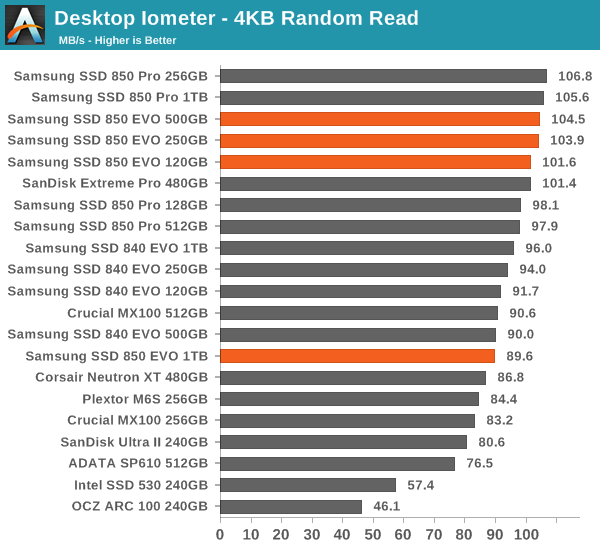
The models with the new MGX controller enjoy excellent random read performance, although the 1TB version isn't bad either. Without knowing the specifications of the MGX controller, it's hard to know what is causing the performance increase, but I still suspect it is due to a higher clock speed.
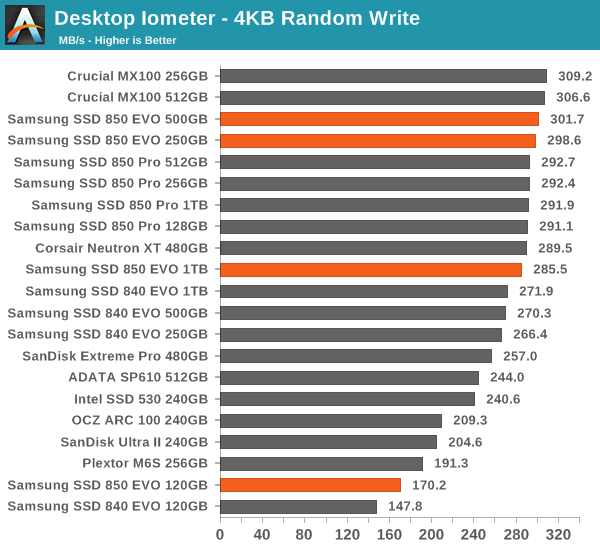
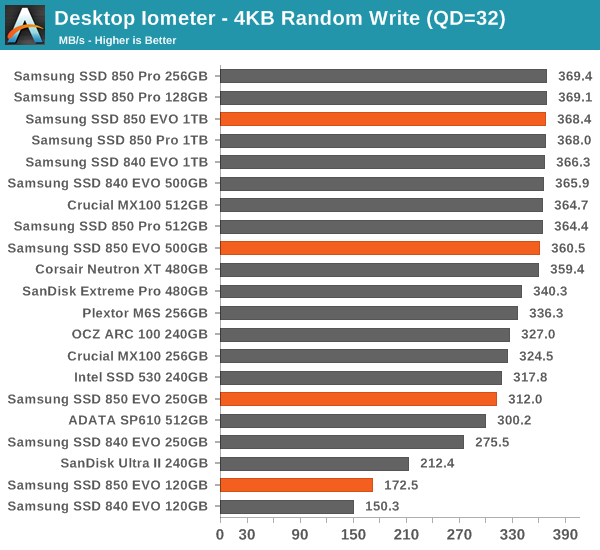
Random write performance also sees an increase across all capacities and is more or less on par with the 850 Pro at larger capacities.
Sequential Read/Write Speed
To measure sequential performance we run a 1 minute long 128KB sequential test over the entire span of the drive at a queue depth of 1. The results reported are in average MB/s over the entire test length.
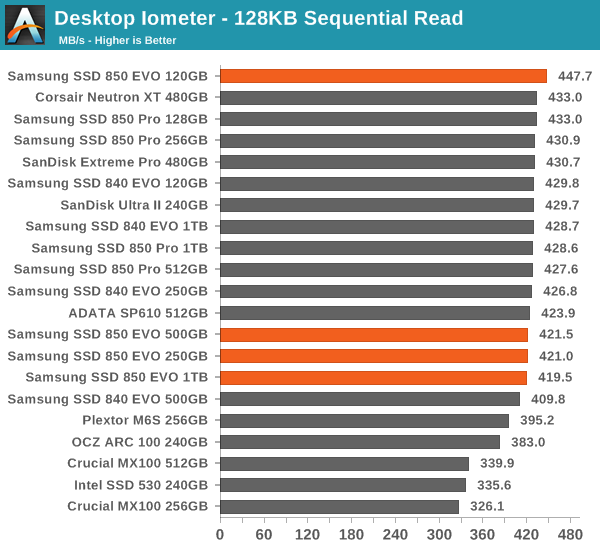
Sequential performance doesn't present any real surprises. Write speed at smaller capacities gets a small boost, but other than that the performance is typical SATA 6Gbps level.
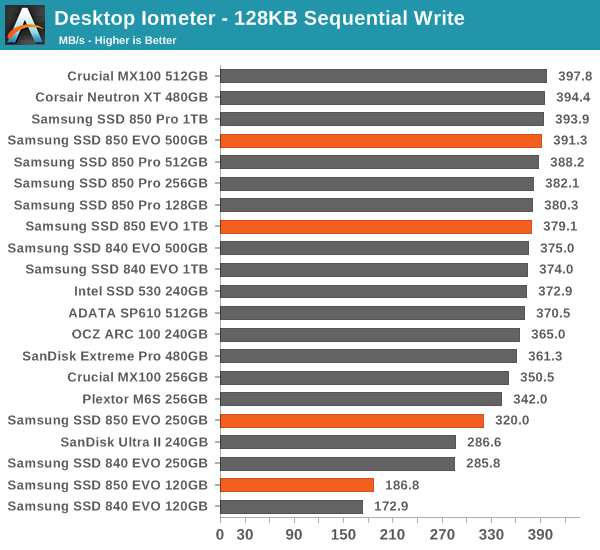
AS-SSD Incompressible Sequential Read/Write Performance
The AS-SSD sequential benchmark uses incompressible data for all of its transfers. The result is a pretty big reduction in sequential write speed on SandForce based controllers, but most other controllers are unaffected.
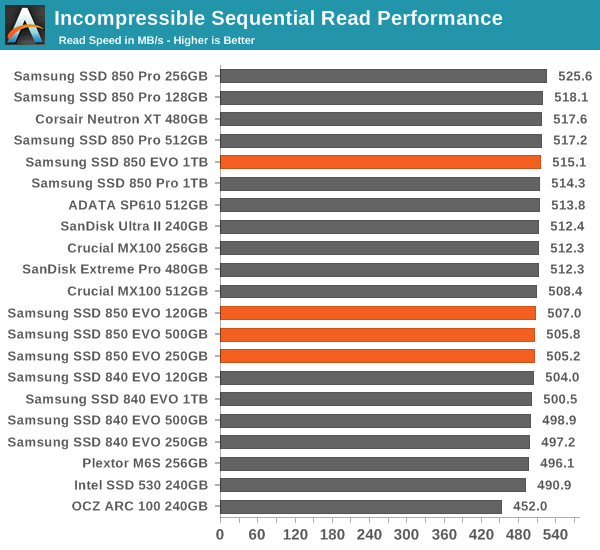
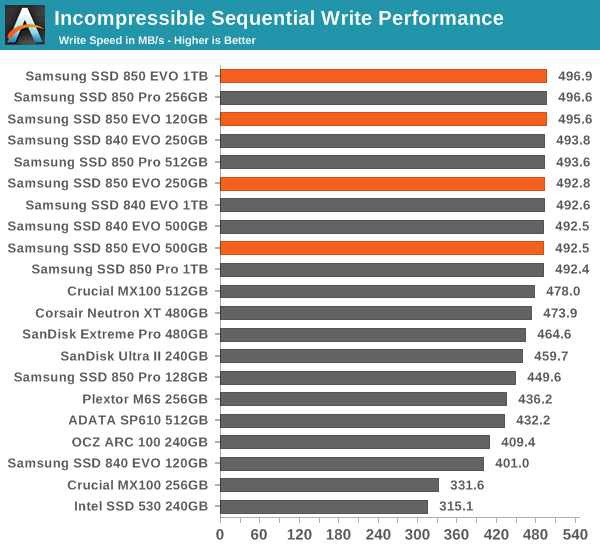










97 Comments
View All Comments
hojnikb - Monday, December 8, 2014 - link
Or 50$ less and get a mx100/ultra IIapoe - Tuesday, December 9, 2014 - link
$10 more than the 250GB 850 Evo and you can get a 480GB Crucial M500 or TWO Sandisk Ultra II's. Even though it's a year and a half old at this point, for most end users the speed difference is negligible but the doubled capacity is not. Like the article says, the pricing (at least the MSRP) seems to be in a weird place...HisDivineOrder - Wednesday, December 10, 2014 - link
Samsung thinks they're Apple.In SSD's.
alacard - Monday, December 8, 2014 - link
thanks for the review. is it my imagination or is the 120gb model missing from the destroyer benchmark?Kristian Vättö - Tuesday, December 9, 2014 - link
I don't usually run the 2013 suite on 120/128GB drives because it's more geared towards large and higher performance drives. Users with such heavy workloads shouldn't be buying small drives anyway for performance and capacity reasons.Memristor - Monday, December 8, 2014 - link
Regarding the price, newegg.com already offers them below the suggested retail price. See here:http://promotions.newegg.com/samsung/14-6480/index...
wallysb01 - Monday, December 8, 2014 - link
Only by $10. That’s not really enough. I got the 480 GB Ultra II for $160 over black Friday, that’s $90 less than this sale on the 500GB 850 EVO. That was maybe an atypically good deal, but even at more regular discounts the Ultra II/MX100 is priced at about $180-$190, maybe $200, which is more like $50-$70 less than this “sale” price 850 EVO.This review is right. Until the price comes down ~$50 per 500GB, I don’t see much reason for people buy the 850 EVO.
fokka - Monday, December 8, 2014 - link
comparing msrp to a black friday deal doesn't make sense.Luscious - Monday, December 8, 2014 - link
Where's the m.2 version?And if Samsung is stubbornly sticking with 2.5 inch drives, why no Sata Express version?
The hardware for both is out there, and has been for some time.
ZeDestructor - Monday, December 8, 2014 - link
It's a SATA drive, so the interface will be SATA and not SATA Express/PCIe. Consequently, an M.2 variant will perform the same, since those variants would also be SATA driven, much like the older mSATA drives - same thing, different form factor, and unnecessary to review seperately.